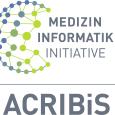Principal Investigator: Eimo Martens
Project goals
Medical societies emphasize the importance of tools for personalized risk assessment to improve the prevention, diagnosis, and treatment of cardiovascular diseases in a targeted manner. However, the implementation of these recommendations in clinical practice in Germany needs to be improved. Technical structures for combining clinical information from different sources need to be revised. Data collection in electronic health records is often not standardized and structured, and data exchange is difficult, which hinders automated individual risk calculations. A standardized infrastructure for high-resolution biosignal analysis, a largely untapped resource for individual risk assessments, is also lacking.
This is where the ACRIBiS project (Analysis and Combination of Routine Data and Biosignals for Risk Assessment in Cardiac Medicine) comes in. It combines standardized and structured clinical records and biosignal analyses at 15 partner sites. It investigates the improvements in individual risk assessment that can be achieved through these measures. ACRIBiS will thus represent a fundamental building block for the future dynamically learning healthcare system and pave the way for demonstrably effective and dynamically adaptive clinical decision support at the patient level.
The work of ACRIBiS focuses on the following objectives:
- Development of structured and standardized documentation: a consensus-based core dataset of routine cardiovascular data will be created that is fully syntactically and semantically interoperable to improve cardiovascular risk stratification and prediction.
- Integration of ECG data from different sources: ECG data will be integrated into interoperable databases to enable location- and device-independent analysis for biosignal-based risk prediction.
- Elaboration of ethics, data protection, IT security, and regulatory requirements: Particular attention will be paid to the use and, if necessary, supplementation of broad consent as well as to the data security of biosignal data, as these represent a highly individualized source of bio-information.
- With these measures, ACRIBiS aims to fundamentally change clinical practice and significantly advance personalized medicine in cardiovascular diseases.
Work plan
Development of structured and standardized documentation
- A cardiovascular core data set definition is necessary for risk prediction models.
- Definition of outcome data for the validation of risk prediction scores.
- Standards for data quality and precision of cardiovascular core data.
- Technical implementation of syntactically and semantically interoperable documentation.
Integration of ECG data
- Integration of ECG waveform data from clinical routine and personal health devices.
- Definition of interoperable common data sets for ECG metadata and results.
- Adaptation of existing risk prediction algorithms to different devices.
- Implementation in the medical data integration center.
Our site is leading the integration of ECG waveforms and adapting existing systems to the identified integration requirements. This includes system architecture, cross-site implementation, and the definition of standard interfaces.
Risk prediction models and reference data
- Provision of reference data and software for risk prediction algorithms.
- Systematic evaluation of prediction performance for different clinical outcome areas.
- Dynamic recalibration of risk models.
- Visualization of implemented models and predictions.
Ethics, data protection, and IT security
- Implementation of a broad consent process (MII Broad Consent).
- Creation of a legal basis for data processing and data exchange.
- Use and supplement existing data protection techniques adapted to different applications.
- Compliance with data protection regulations and assessing data protection impact.
Our expertise leads the way in ensuring compliance with data protection and implementing appropriate protection mechanisms for biosignal data.
Dissemination and implementation
- Harmonization of clinical documentation across all sites.
- Implementation of biosignal collection and processing capabilities.
- Recruitment and informed consent of the ACRIBiS cohort.
We manage the communication and coordination structures and ensure the implementation of the biosignal infrastructure according to a consensus-based plan.
The ACRIBiS project demonstrates how structured and standardized approaches to data integration and the consideration of ethical and data protection requirements can create a dynamically learning healthcare system that enables precise and personalized medical decisions.




